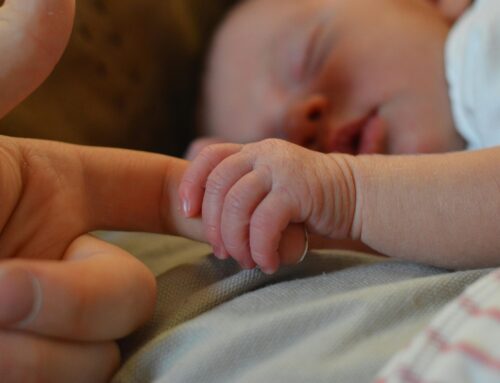A Jewish Mother Asks: Should I Have a Bris for My Son?
Question: I would define myself as a non-practicing Jewish woman, married to a non-Jewish man. I grew up in a traditional Jewish household in Skokie, Illinois, and met my husband in college. We got married almost three years ago and had a few Jewish elements in the wedding, but aside from that, religion hasn’t really been a part of our life together. We just bought our first home together in Highland Park, Illinois, and I’ve been very happy with our life together. But now that I’m pregnant with a boy, I feel strongly about having him circumcised by a mohel, in a bris with family and friends. My husband isn’t aware of this tradition, and I don’t know how to bring it up without completely shocking him. What should I do?

As an Orthodox mohel, I naturally have my own perspective on this question, rooted in tradition, Jewish law, and the deep significance of a bris. However, I thought it would be interesting (and add a layer of depth and wisdom) to reach out to a variety of professionals and acquaintances to hear how they would respond. From Rabbis to therapists, from medical professionals to close friends and families that I’ve served, each offers a unique lens on this important decision. Here are their answers.
The Orthodox Rabbi Perspective: Rabbi Pesach Siegel (My Rebbe)
First of all… Mazel Tov! I hope and pray that your path towards bringing the blessing of a precious living being into this world goes well and in good health. Having strong feelings about an issue that your husband is totally unaware of is a sensitive issue. Evidently, you haven’t spoken to one another about the “identity” of your future children. The main issue to discuss is not the bris, it is about your children’s Jewish identity.
After three years, you know his sensitivities more than anyone. So, with sensitivity, bring up the subject. The most effective pathway is through mutual dialogue, and by giving him time and space to learn about the tradition. He might have questions and concerns. Perhaps he would like to consult with a medical professional and/or a mohel. If you are happy in the marriage, that tells me that it is your husband’s wish that you be happy. If this means so much to you, it will mean as much to him.
The Jewish Grandmother Perspective: Harriet Goodman
I would tell her the same thing I told my own granddaughter, who was in the same situation,
“Of course, he needs a bris! That’s just what we do!”
Sweetheart, I had the same conversation with your mother when she was expecting you! That was before she told me the gender, of course. Listen, a bris is not just some religious thing, it’s what Jewish families do. It’s tradition! Your great-grandfather had one, your grandfather had one, and now your son should too.
I remember when your uncle was born—your grandfather was so nervous about the bris, but afterward, he was the one who told everyone how proud he was. Your husband might not understand right away, but if you show him how much it means to you, he’ll listen. Explain that this is part of your identity, your history. He doesn’t have to be Jewish to respect something important to you.
And don’t worry, these mohels are experts—it’s over in a minute, and then we eat bagels and celebrate!
The Personal Therapist Perspective: Dr. Rebecca Fields, Licensed Professional Counselor (LPC)
“Explore what this means to you before presenting it to your husband.”
Pregnancy can bring unexpected emotions and desires to the surface. You may not have felt strongly about Jewish traditions before, but something about bringing a new life into this world has awakened a deep, possibly even subconscious, connection to your heritage. That’s important. Before you bring this up with your husband, take some time to explore why this matters to you. Is it about honoring your family history? Is it about a sense of belonging? Is it a way to reclaim an aspect of your identity that you may have previously set aside?
I once worked with a woman who had barely thought about religion for most of her adult life. But when she became pregnant, she suddenly felt a strong urge to reintroduce Jewish traditions into her family. She struggled to articulate why, and at first, her husband dismissed it as hormones. But after sitting with her thoughts, she realized that her childhood memories of Judaism (lighting Shabbat candles at her grandmother’s table, attending Passover seders, etc.) brought her a sense of comfort and connection she wanted to pass on to her child. Once she was able to explain this to her husband, he understood that this wasn’t just a whim, but something deeply personal and meaningful to her.
If your husband is unaware of this tradition, he may initially react with confusion or resistance. This doesn’t mean he’s rejecting your feelings—it just means he hasn’t had time to process them. When you bring it up, try not to frame it as a demand, but as an open conversation:
“I’ve been thinking a lot about how we’ll welcome our son into the world, and I realized that having a bris is important to me. I’d love to share why and hear your thoughts, too.”
This approach invites discussion rather than confrontation. Give him space to ask questions and voice concerns, and don’t rush to convince him. Just help him understand why this is so significant for you. The goal isn’t to win an argument, but to build a mutual understanding that will strengthen your partnership as parents.
The Marriage Therapist Perspective: Dr. Laura Bennett, Licensed Marriage Therapist
“Navigating interfaith parenting requires empathy and teamwork.”
Marriage is about compromise, but it’s also about honoring each other’s deeply held values. When it comes to parenting decisions, especially in an interfaith relationship, it’s important to approach discussions with curiosity rather than defensiveness.
I once worked with a couple where the wife, raised with some Jewish traditions, wanted a bris for their son, while her husband, who wasn’t Jewish, was hesitant. She initially framed it as a religious requirement, which made him feel like he had no say. When we reframed the discussion—focusing on the emotional and familial significance rather than obligation—he became more open. He still had concerns, but instead of rejecting the idea outright, he engaged with it.
For your husband, this may feel like a brand-new concept, so give him space to process it. Use “I” statements. For example, “I feel really connected to this tradition”, rather than “We have to do this.”
Validate any discomfort he may have and invite him to learn more. You are setting the stage for many future parenting discussions, so model the kind of dialogue you want to have moving forward.
The Doula Perspective: Jessica Marks, Certified Doula
“Birth and early rituals can be deeply emotional. Honor that.”
As a doula, I’ve been by the side of many new mothers navigating these big decisions. It’s completely natural to feel a strong pull toward tradition when bringing a child into the world. A bris isn’t just about circumcision, it’s a deeply meaningful way to mark your baby’s arrival.
One of my clients was in a very similar situation—secular, interfaith marriage, unsure how to introduce the idea of a bris. She started by explaining to her husband that this was more than just a procedure; it was a moment of connection to her ancestors and a way to welcome their son with love and community. Once he understood the emotional significance, he was much more open to it. Approach your husband with openness, and let him see why this matters to you.
The OB/GYN Perspective: Dr. Michael Roberts, OB/GYN
“A mohel is a specialist. This is what they do best.”
As an OB, I perform circumcisions in the hospital, but I also recognize the unique expertise that mohels bring to the procedure. They specialize in this one practice, often performing hundreds or even thousands of circumcisions in their careers. The precision, speed, and comfort level they provide are unmatched.
I’ve had many patients over the years who were uncertain about where or how to have their son circumcised. What I always tell them is this: if it’s important to you to have a bris, don’t be afraid to stand by that choice. It’s quick, safe, and done in a warm, loving environment. Your husband might have medical concerns, so reassure him that mohels are highly skilled and the experience can be far more personal and meaningful than a hospital setting.
The Best Friend Perspective: (Name changed for privacy)
“Girl, just tell him! He married a Jewish woman. He had to know this was coming!”
Listen, you and I both know your husband is an amazing guy, but he’s not a mind reader. If this is important to you, you need to tell him. Yes, it might surprise him, but you’re not springing something crazy on him. It’s a Jewish tradition that has been around forever! He married a Jewish woman, and even if you haven’t been super religious, this is part of who you are.
Remember when I was debating whether to keep my last name after I got married? I thought my husband wouldn’t care, but when I finally brought it up, he was totally supportive! He just hadn’t realized how much it meant to me. Your husband loves you, and he’s going to want to understand why this matters to you. So just be real with him!
And worst case? If he freaks out a little at first, I’ll be there with wine and moral support.
The Confidant Perspective: (Name changed for privacy)
“This sounds like more than just a bris … it’s about your identity.”
I hear you. You’ve never been that into religious observance, but now something inside you is pulling you toward this. That’s worth paying attention to. It’s not just about a bris … it’s about how you see yourself and how you want to raise your son.
I remember when I had my daughter and suddenly felt this deep urge to light Shabbat candles. I couldn’t explain it. It wasn’t about rules, it was about connection. Maybe that’s what’s happening with you.
Before you even bring this up with your husband, take some time to sit with your own feelings. Ask yourself, “What about this ritual is calling to me?” Is it about family? History? Identity? Once you understand that, you’ll be able to explain it to him in a way that he can hear. And I’ll be here to talk it through with you, no matter what.
The Orthodox Mohel Perspective: Rabbi Shmuel Katz, Certified Mohel
I’ve saved my response for last in order to provide content and context. If you’ve made it this far, then you’ve already heard many different perspectives encouraging introspection, soul searching, open dialogue, empathy, vulnerability, and love.
If I may, I’d like to add an element which has yet to be spoken about. It is possible that despite all your attempts at introspection, you may feel that you lack the proper words to describe why it is that you feel strongly about this. You may find this discouraging as you feel something that you can’t describe. This is perfectly normal.
Many feel this spark pulling them towards acts of holiness, but lack the words to describe it. The challenge in this modern world we live in is that we often do not give enough credit to this instinct to connect to something higher. We often feel the need to rationally defend this position. So let me help you.
As you know, the tradition of Bris Milah (circumcision) has been transmitted from parent to child for thousands of years in an unbroken chain going back to our forefather Avraham (Abraham). So many Jews over the centuries, religious and irreligious, have risked their lives to fulfill this mitzvah – this bond. There are many heartbreaking stories throughout our history of the Crusades, the Holocaust, and more, where families were willing to die rather than forgo this connection.
We are so blessed to live in an unprecedented era of religious freedoms. You now have an opportunity in front of you that countless mothers would die for. You have the opportunity to give your son one of the greatest gifts of his life, the gift of connection. By performing a proper Bris Milah, you are providing your son with a connection to his people, to his God, to his tradition, to eternity.
The reality is that your son is just as Jewish as you are, which is 100%. In this world of divisiveness, so many people struggle to find community. Your son, regardless of whether he chooses to perform any other Mitzvahs for the rest of his life, will ALWAYS be accepted in the Jewish community as a brother and as an equal. What greater gift can a mother give her child?
You have the ability now to connect him with his heritage, a rich tradition with nearly 4,000 years of history. This chain has managed to last through all the challenges of time, connecting your unique link to our humble beginnings as a nation. Give your son the gift of connecting his unique link to our beautiful & mighty chain.
I promise as a professional with over a decade of experience that I will take the best care of your son. The procedure itself is incredibly quick and the recovery as an infant is so fast and easy. The blessing and impact that you will be imparting, on the other hand, will last more than a lifetime; it will last an eternity.

Final Thoughts
I hope your found this article helpful. If you’re feeling a deep pull toward giving your son a bris, I strongly advise you to follow the advice of the many professionals quoted above. Enjoy this time of introspection and use this as an opportunity to connect even deeper with your husband through open conversation. If you would like to discuss this further, I would be honored to help guide you through this process and to provide your son with a meaningful and professional Bris Milah.
If you would like more information, please feel free to peruse some of my other blogs, like Circumcision – Answering the Who, What, Where, When, Why and How
To schedule a consultation, contact me at The Chicago Mohel today.
📞 Phone: 347-794-6322
📧 Email: thechicagomohel@gmail.com
🌐 Website: thechicagomohel.com



